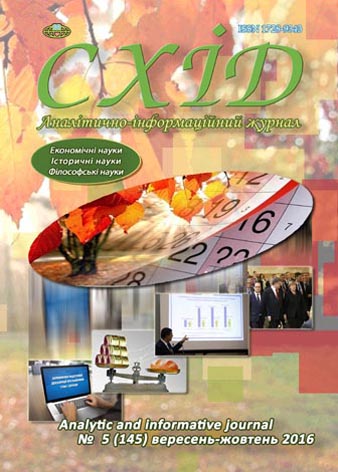Virtual games as culture phenomenon of modern
DOI:
https://doi.org/10.21847/1728-9343.2016.5(145).83810Keywords:
video/computer game, homo ludens, postindustrial society, pseudoreality, "society of experience"Abstract
In this article authors attempt to determine the role of video / computer games, as one of the most influential phenomenon of the modern culture in the discourse of social philosophy. In the analysis of this scientific problem authors appeal to the classical culturological conception of netherlandish thinker J. Huizinga, which is well - known as the "homo ludens" conception. Particular attention is paid to the contradictions of reality, with which every individual inevitably faces during his life, and artificially constructed a pseudoreality. This contradiction tirelessly leads to the crisis of legitimation social institutions in the modern post - industrial society.
Video / computer games, becoming one of the most exciting components of modern mass culture, influence both on the mental, emotional, moral condition of individuals and on the development of society as a whole.
Such influence of virtual games is ambiguous: on the one hand, these games can help human to meet needs in so-called "thrill", the newness, experience of something unusual, but on the other hand reduces need for development of critical thinking, imagination. Video games shift existential focus from the real existential, creative work to the virtual life, which has any creative mission.
Video / computer games in a globalizing world are actively helps users to accept more easily unfamiliar culture for them. The phenomenon of social space, contribute to the understanding of bias own perception of the world, increasing the role of axiological relativism and is accompanied by a crisis of social institutions' legitimation. Virtual games also become one of the main factors that transformes modern civilization from the "consumer society" into "society of experience" or "experience consumption society" - society that is relatively strongly defined understanding of life, having an inner orientation.Downloads
References
Philosophical Encyclopedic Dictionary (1997), Infra Publishing, Moscow, 576 p. (rus).
Huizinga, Johan (1992), Homo ludens. Man playing [translat.], Progress, Moscow, 464 p. (rus).
Samoylova, H. and Shayev, Y. (2015), Virtual reality as a narrative: linear and nonlinear, Fundamentalnye issledovaniya, №2-9, 2033-2035 (rus).
Chernov, R. (2007), Basics of ludological cognition, Raduga Publishing, Moscow, 422 p. (rus).
Shaw, A. (2010), What Is Video Game Culture? Cultural Studies and Game Studies, Games and Culture, October, vol. 5, no. 4, 403-424. doi: 10.1177/1555412009360414
Sultanova, M. (2014), Lawrence Minella. Game and culture (post) modern. (Essay about changes in the scientific interest to the phenomenon of the game). (Transl.), Psychology and psychotechnology, № 11, 1186-1204. doi: 10.7256/2070-8955.2014.11.13438
Şentuna, Barış & Kanbur, Dinçer (2016), Any future updates will be listed below What kind of an activity is a virtual game? A postmodern approach in relation to concept of phantasm by Deleuze and the philosophy of Huizinga, Sport, Ethics and Philosophy, Vol.10, Issue 1, 42-50. doi: 10.1080/17511321.2016.1177581
Sotnikova, O. (2005), Play and communication in social virtual reality of 2005 year, Thesis abstract candidate of philosophical sciences in specialty 09.00.03, Kharkiv, 17 p. (ukr).
Kurylenko, I. (2015), Transformation of the games’ phenomenon in the discourse of postmodernism, Ukraine’s culture, Vol. 49, pp. 41-50, available at: http://www.ic.ac.kharkov.ua/RIO/kultura49/06.pdf
Kauyya, R. (2007), Games and people. Articles and essays on the sociology of culture, United humanitarian publishing, Moscow, 304 p. (rus).
Schulze, G. (2007), Die Zukunft der Erlebnisgesellschaft, in: Oliver Nickel (Hrsg.). Eventmarketing, München, 307-318. doi: 10.15358/9783800643721_307.
Downloads
Published
How to Cite
Issue
Section
License
Copyright (c) 2016 Olga Alieva, Marina Zhukova

This work is licensed under a Creative Commons Attribution-NonCommercial-NoDerivatives 4.0 International License.
1. Authors bear responsibility for the accuracy of facts, quotations, numbers and names used.
2. Manuscripts are not sent back.
3. The publisher does not always agree with the authors' opinion.
4. The authors reserve the right to authorship of the work and pass the first publication right of this work to the journal under the terms of a Creative Commons Attribution-NonCommercial-NoDerivatives 4.0 International License. This license allows others to distribute (copy) the published work for non-commercial purposes, provided there is mandatory attribution to its authors and a link to the first publication in our journal.
5. The authors have the right to conclude separate supplement agreements that relate to non-exclusive work distribution in the form in which it has been published by the journal (for example, to upload the work to the online storage of the journal or publish it as part of a monograph), provided that the reference to the first publication of the work in this journal is included.

